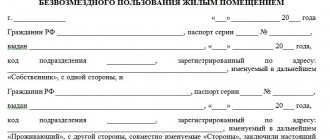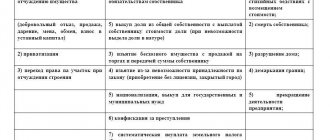Grounds for eviction without provision of other housing under a social tenancy agreement
One of the key types of eviction of a tenant from housing is considered to be eviction without providing the subject of legal relations with another residential premises, which is considered a fairly serious legal consequence, the basis for which is recognized as failure to fulfill obligations under the contract for the provision of a municipal apartment.
In addition, the grounds for eviction from housing without the provision of other residential premises are regulated by Art. 91 Housing Code of the Russian Federation. These include:
- use of a municipal apartment other than for its intended purpose;
- violation of the rights and interests granted to third parties (neighbors) under the legislation of the Russian Federation;
- mismanagement of the property of the municipal apartment and the residential premises itself, which leads to its destruction;
- arbitrary occupation of residential premises, the provision of which is carried out only on the basis of a social tenancy agreement;
- redevelopment or refurbishment of housing that has not been agreed upon with the authorized bodies;
- the impossibility of living in the same territory with children of parents deprived of parental rights by a court decision.
Thus, eviction from a residential premises without the provision of other housing is possible taking into account both one of the grounds listed above, and in their totality.
Grounds, reasons, in what cases?
So, we found out that eviction from a municipal apartment is possible.
On what grounds can a tenant be evicted from a non-privatized living space?
- Absence from residence
A fairly common case: a person registered in a municipal apartment, but then moved to another address. For example, to a cohabitant or common-law spouse. If the owner is not notified of the departure, the person may be forcibly evicted. Reason: absence from place of residence for more than 3 months.
- Damage to property
The threat of collapse of structures, the use of housing for other purposes, violation of sanitary and urban planning standards - all these are reasons to warn and then evict the tenant from a municipal apartment (Clause 1 of Article 91 of the Housing Code of the Russian Federation).
- Debts for housing and communal services
Living in a non-privatized apartment is much more profitable in terms of financial expenses. But some residents accumulate debts and do not want to pay for utilities. Debt for more than 6 months may become grounds for eviction of a tenant from an apartment.
- Deprivation of parental rights
Mothers and fathers who are deprived of parental rights cannot live with the child under the same roof (clause 2 of article 91 of the Housing Code of the Russian Federation). It is important that such a decision is made by the court - this will be the reason to formalize the separation of the parent and child.
- New housing
An unexpected inheritance, a gift from a relative, entering into a mortgage, buying and selling housing are grounds for moving out of a municipal apartment. If a person acquires his own property, the authorities will terminate the social tenancy agreement with him and ask him to move out. The public housing fund is not unlimited, so apartments are available only to the low-income segments of the Russian population.
The occurrence of these and other circumstances leads to the eviction of residents from a municipal apartment. Responsibility for the procedure lies with the owner of the property, i.e. to the local government body.
Systematic violation of the rights of neighbors. Eviction of persons who arbitrarily occupied residential premises
Very often in legal practice, cases arise that concern the eviction of tenants and his family from a municipal apartment without the provision of other housing due to systematic violation of the rights of neighbors. In particular, infringement of interests occurs due to the fact that the use of common property goes against all the rules that are enshrined in the legislation of the Russian Federation.
However, it is worth noting the fact that there is no legal norm as such in the legal acts that regulates the legitimacy of the eviction of citizens from residential premises. Therefore, the application of this basis is possible only to former family members who, when family relations are broken, are given the status of neighbors. The fundamental determinants in this situation are systematic violation of hostel rules, non-payment of utilities or rent.
The injured person may demand the forced eviction of a former member of the family from a municipal apartment, but the claim must be supported by weighty arguments for violation of the legal rights and interests of other persons.
The court decision will not imply the possibility of providing the offender with alternative housing. When making a decision on forced eviction, the judicial authority also takes into account the fact that the housing was occupied by the tenant and members of his family without the consent of the authorized government agencies. The current Housing Code does not provide for an independent norm that is aimed at resolving this issue. Therefore, in such situations, the justice authority relies on Art. 304 of the Civil Code of the Russian Federation.
Is it possible to evict a registered person from a municipal apartment?
Every citizen of our country has the right to housing. Low-income segments of the population receive the right to use non-privatized apartments from the state housing stock.
Even if a person is registered in a municipal apartment, he can be evicted . The question arises, in what cases? They are usually associated with a violation of the rules of living in the apartment.
According to Art. 84 of the Housing Code of the Russian Federation, eviction from municipal housing is as follows:
…with the provision of a new apartment or dorm room;
...without providing other housing;
...voluntarily by the employer and members of his family;
...without consent, i.e. forced eviction through court.
Before you evict a tenant, you must deprive him of his right to use the property. Consequently, the plaintiff demands not only the evacuation of the tenant, but also the termination of the evicted person’s right to use the residential premises. There are plenty of reasons for eviction, all that remains is to sort them out.
Destruction or damage to residential premises, use of it for other purposes
An equally common reason for eviction of a tenant or his relatives from the territory of a municipally owned apartment without providing other housing is considered to be damage to real estate.
Since the Housing Code of the Russian Federation implies, when signing a social tenancy agreement, the emergence of certain obligations on the part of the participants in the legal transaction, violation of the conditions determines the application of sanctions in the form of eviction. However, the provision of other housing is not provided for by law.
In particular, the NLA establishes that the destruction of a municipal apartment must be carried out systematically and purposefully. In this case, window and door openings, walls and floors of property, plumbing equipment, etc. are damaged. Thus, for the court to take this basis into account, the mere fact of damage to real estate is not enough.
The applicant must provide irrefutable evidence of systematic actions on the part of the employers.
Housing from the municipal or state fund is provided to individuals solely for the purpose of their permanent residence on the premises. No other purposes are provided. Therefore, if the tenant uses the apartments without taking into account the original purpose, then eviction may follow without the allocation of another living space. This rule of law is enshrined in Art. 17 Housing Code of the Russian Federation.
Deprivation of parental rights as a basis for eviction without provision of other housing
An equally important reason for the eviction of a person from the territory of a residential premises without providing the participant in the legal relationship with other housing is the impossibility of living in the same territory for children and parents who have been deprived of parental rights.
Before making a decision on the forced eviction of a person without allocating him another housing from the social fund, the judge must objectively and impartially assess the possibility of cohabitation between a minor child and his parents. If it is proven that adults violated the interests and rights of the child, the court makes a positive decision in the direction of terminating the social tenancy agreement and eviction of the subject of legal relations.
Thus, the application of this legal mechanism is aimed primarily at protecting childhood, which is recognized as the fundamental direction of the social policy of the Russian state.
How to evict a registered person from a municipal (non-privatized) apartment?
The review of methods for eviction from public housing is limited to two options:
- Eviction by consent is voluntary eviction from an apartment or refusal to register in municipal housing.
- Judicial eviction is based on a court decision, usually along with the termination of registration. Used in case of systematic violation of living conditions by the tenant.
Please note that if the tenant of the apartment evicts, family members do so along with him.
Who is eligible?
Eviction from an apartment is the process of terminating a social tenancy agreement with all the ensuing consequences.
The question arises: who can initiate the eviction of a tenant from a municipal apartment?
- housing manager, i.e. the owner represented by the administration or government body;
- representative of the housing inspection - in case of detection of violations in the operation of the residential premises;
- housemates – if there is a systematic violation of their rights;
- tenant - if family members have debts to housing and communal services;
- guardianship and trusteeship authorities - in case of resettlement of a mother (father) deprived of parental rights.
Practice shows that the plaintiff is usually a local government body. Residents or guardianship authorities can file a complaint against a negligent tenant, and thereby take the initiative. Read what is a notice, warning and requirement to evict from an apartment, and how to draw it up?
Procedure, algorithm
Let's look at step-by-step instructions on how to evict an unscrupulous tenant of a municipal apartment. If a person does not want to leave the premises, he will have to go to court.
Algorithm of actions and procedure:
- Complain to the municipality to warn the tenant.
- Warning to the tenant by the owner.
- Preparation of a claim and documents for going to court (see “Statement of claim for forced eviction from an apartment”).
- Sending the package to the court at the location of the property.
- Conducting court hearings and issuing a final verdict.
- The owner receives a copy of the court's conclusion.
- Contacting the Department of Internal Affairs to discharge the resident.
- Forced eviction of a tenant together with bailiffs, the Ministry of Emergency Situations and the police.
Residents do not need to do everything themselves - the procedure is often entrusted to the shoulders of the owner of the municipal apartment. Residents and neighbors can help prepare evidence in favor of the plaintiff.
Documentation
Standard package of documents for judicial eviction from a municipal apartment:
- ID card - passport (for citizens), legal documents + power of attorney to conduct business for a representative of the administration;
- a copy of the social tenancy agreement for housing (in the name of the tenant);
- receipt of payment of state duty;
- extended extract from the house register - information about persons living in the apartment (tenant + members of his family);
- extract from the Unified State Register of Real Estate with cadastral data for the property;
- statement of claim for recognition of the loss of the right to use residential premises + demand to evict the tenant from the apartment.
There is no need to delay submitting documents to the court - some certificates have a limited validity period (for example, 30 days). The sooner you send documents to the court, the sooner the court hearing will take place.
Evidence base
It is very important to collect reasoned evidence in favor of evicting a tenant from an apartment. If this is not done, the court will simply reject the claims.
What may be included in the evidence base:
- an extract from a personal account - shows arrears in utility bills (if it is not the tenant who is being evicted, it is more difficult to prove the fact of non-payment);
- conclusions of the sanitary and epidemiological station, housing department, BTI and other organizations - proves the presence of illegal redevelopment, damage to property, communication nodes;
- written testimony;
- protocols of the district police officer, law enforcement agencies, prosecutor, bailiffs - can confirm the inappropriate behavior of the tenant;
- a copy of the court decision on deprivation of parental rights - useful in case of eviction of a mother/father who was deprived of the right to raise a child.
What to collect and what evidence is needed is usually decided by the municipal authority. There are no particular problems with the preparation of evidence.
Cost, terms
The costs of litigation are not too high. The plaintiff will have to pay a state fee for filing an eviction claim - 300 rubles (Article 333.19 of the Tax Code of the Russian Federation), and also spend money on a number of certificates.
But since all preparations for eviction are handled by the municipality, costs will be minimal. Tenants will not have to pay to evict a rowdy, debtor or ex-parent.
Proceedings in cases of eviction from an apartment last from 60 days or longer . It is hardly possible to calculate the exact period, because... it is influenced by many factors - failure to appear at hearings, appeal, counterclaim, cassation appeal, etc. Direct eviction from an apartment takes from 3 to 7 days , and if the tenant refuses to move out voluntarily, bailiffs and a local police officer are involved.
Sample statement of claim for eviction from a municipal apartment
An application to the court is made in the form of a statement of claim. The name of the document depends on the demands made by the plaintiff. Our case is eviction from a municipal apartment. Hence the name - a statement of claim for loss of the right to use residential premises (room).
The form of the document is written. The information must meet the requirements of civil records management. The application format is a blank A4 sheet or a template where you need to enter specific household information.
We offer a sample template:
Categories of persons who can be evicted
Particularly relevant is the issue that concerns the possibility of eviction without providing other premises to a certain category of persons. Modern Russian legislation will help you find the answer. So, you can evict from your home:
- Tenants of an apartment under a social tenancy contract who do not have ownership rights to the specified real estate.
- Former family members. However, as practice shows, it is quite difficult to evict this category of citizens, since, despite the breakdown of family relationships, the former spouse remains a co-tenant of the apartment.
- Participants in a social tenancy agreement who do not fulfill their obligations under the social tenancy agreement.
At the same time, the legislation establishes categories of citizens who cannot be evicted. This is first of all:
- persons who have been awarded disability group I or II;
- children left without parental care (orphans);
- subjects of legal relations who retired upon reaching age;
- relatives of the deceased employer;
- families of military personnel who either died or are considered missing.








